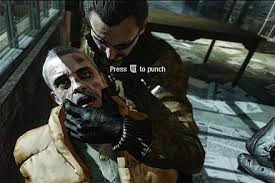“Don’t you morons get it? If you think your government sponsored brutality intimidates me, you clearly don’t know anything about Dragovich. I have nothing to gain by talking to you.”
Dr. Daniel Clarke is remarkably calm as the stony faced CIA agent Jason Hudson forces him into the chair. He smashes the only window in the dirty apartment; no one would miss it, and places one of the broken shards into Clarke’s mouth. The doctor’s eyes flash wide with terror for a brief moment before Agent Hudson rams his fist into his mouth, mutilating his gums and tongue.
The mere thought of placing a sharp object inside of someone’s mouth and proceeding to smash their head in order to blend their mouth into a fine mush is one that would make even the most hardened men wince out of empathy. In any TV show, Jason Hudson would be a sociopath on par with the likes of Dexter Morgan. But he’s not a TV character; he’s a grade-A video game protagonist.

Jason Hudson hard at work.
Torture sequences like this one seen in Call of Duty: Black Ops are becoming more and more prevalent in modern shooters nowadays. As cinema moved towards gritty anti-heroes for protagonists, so did video games.
These torture sequences allow modern protagonists to demonstrate their resolve for completing their mission and look badass while doing so. The player, naturally, feels badass in the process. Who wouldn’t? You get to stare your enemy in the face and put the fear of God into him before you tear the plot right out of him. You feel powerful as you drive a knife through his hand. You feel like a badass when you knock his teeth in. Most importantly, however, you don’t feel wrong.
Most action-y video games are a power trip in some way. You face forces stronger than you and you come out on top usually with a combination of skill, cunning, and extremely large guns. There is no problem with this whatsoever. There IS a problem with a growing trend of torture sequences in which the player is the torturer rather than the other way around like it used to be. Sure, it’s still the same power trip, but there’s one massive change that people tend to miss when they step into the shoes of the torturer: this time, the enemy is helpless. The game encourages the same catharsis you feel for besting a worthy opponent from beating on someone who is completely at your mercy. Call of Duty: Modern Warfare 3 ends a climactic and frenzied firefight with the brutal interrogation of a Somali warlord. The player and company flood the room with toxic gas and offer a gas mask to the cowering warlord only if he offers valuable information. You can feel nothing but satisfaction at holding a once-powerful man at your mercy despite committing what could be construed as a war crime all for the next bit of plot.

The perfect way to end any firefight.
That’s the biggest problem with this trend. Most shooters with a torture scenario don’t give it the attention it deserves. Games that throw in the torture sequence as a simple plot device are associating the harm of the helpless with the valorous acts of combat all because the way they handle it is lazy at best. They don’t have the time nor interest in making torture a moral quandary for the player, so they just allow him to beat the plot out of the unlucky minion and call it a day. The torture is portrayed as brutally effective all because the developers didn’t want to make the scene too long. This lack of care is encouraging the association of torture and badassery. I’m not saying that this will subliminally encourage players to engage in acts of wanton cruelty in real life because that would be incredibly flawed and flat out dumb. What I am saying is that this will contribute to torture being viewed as not only necessary but a righteous act, and that’s the last thing we need.
Of course, there are games that handle the subject with great care and attention, and I applaud them for that. Funny enough, Grand Theft Auto V has one such example. The game makes it extremely clear that torture is doing absolutely nothing for information gathering purposes. Whatever information the victim gives up goes unnoticed through the psychotic glee the player character feels at being able to torture him for… said information. It doesn’t make the player feel like a badass, it makes them feel like a monster.

More psychopath than badass.
Presenting the subject in a way that will make the player think is the perfect antidote to this problem, but unfortunately not every game has the patience or time to do that. We don’t need to avoid the subject of torture. In fact that’s the last thing we need to do. What we need to do is talk about it more, and actually talk about it. Not as a hokey plot device but with all the seriousness the subject demands.




